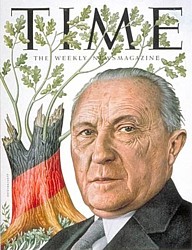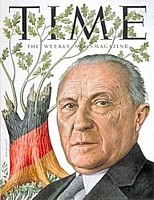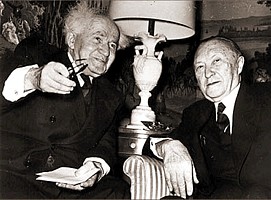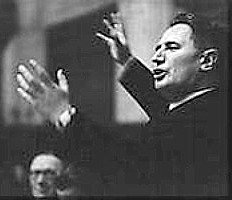|
After nearly a decade since WWII ended, the time to compensate the struggling Israeli state was about to begin. In response to the letter sent out by the Israeli government in March of 1951 to western occupying powers, Konrad Adenauer (left), Chancellor of West Germany, replied to Dr. Nahum Goldmann (right), Chairman of the Claims Conference, stating that the day of negotiations had come, and that his government was agreed to accept the claims in which was stated in the letter of March 1951 (Lavy, 8). This was an extremely tempting offer by the Federal Republic to Israel, for Israel was in desperate need of economic aid, and due to the fact that Israel was located in a hostile area with not many friends to receive support, it needed all the help it can get. After the approval from the Knesset, the Israel’s legislature, the Israeli government responded back to the Federal Republic’s offer; as a result, violent protests were held outside the Jerusalem parliament building (Lavy, 8). After further negotiations, on September 10, 1952, the ‘Restitution Agreement’ was signed at Luxembourg, thus, initiating West Germany’s compensation to Israel (Feldman, 65). Now the state of Israel was receiving a steady flow of economic aid, plus, weapons were also secretly transported from Germany to Israel; unfortunately, the shipment of weapons had stopped, for it raised tension amongst the neighboring Arab countries (Lavy, 57). Moreover, in the mid1960s, the Luxembourg Agreement of 1952 was coming to an end, thus, the Israeli government would no longer have a legal hold over West Germany, for West Germany carried its end of the bargain (Lavy, 141). Although Israel did not have a legal hold on the Germans, it did have a moral holding (Lavy, 136). David Ben-Gurion, Israel’s Prime Minister, made the argued, to former Chancellor Adenauer and current Chancellor Live Eshkol that “the loss of the Jews of creative powers during the Holocaust was an ongoing handicap to the development of the Jewish State” (Lavy, 141). Even though there was constant sympathy for Israel, the German people were growing impatient due to the fact of frequent reminders of Germany’s past (Lavy, 141). However, the Israeli government was doing everything in their power to persuade West Germany to continue their economic support, and again, reminding them that the expiration of the Luxembourg Agreement did not mean that they were free from their moral debt. Adenauer finally expressed to the German people that his “impressions and experiences in Israel have strengthened my conviction that we must never desert this struggling state” (Lavy, 141). With that said, Germany continued its economic aid to Israel.
West Germany was doing well in regards of making generous material and economic compensations to Israel, but Germany’s de-Nazificating itself was the true test to prove its sincerity to all Jews and to the world. There were three factors that determined West Germany’s will to overcome the past, which were the abolition of all traces of Nazi ideology, the removal of formal active Nazis from public posts, and the punishment of those that were responsible of either planning or participating in the killing and/or torture of innocent people (Lavy, 73). Unfortunately for the West Germans, it did not look appealing to the eyes of the Jewish people that the first actions taken against those that committed crimes on humanity and war were handled by the occupying forces; this was due to the fact that from 1945-49, Germany was under a military government (Lavy, 74). For instance, the Nuremburg trials held in 1946 convicted seventy-four major Nazi leaders of war crimes (Wilkins, 58). As much as West Germany wanted to illustrate its sincerity to Israel, it also wanted to distance itself as far away as possible from its past. During the Potsdam Conference held in 1945, which was held by the allied forces to determine what was to become of defeated Nazi Germany, it stated that all war criminals involved with the Nazi regime would be arrested and brought to justice (Lavy, 83). As a result, thousands of formal active Nazis we either sent to prison, executed, or de-Nazified. However, a Statute of Limitations was set up by West Germany that established a date, May 8, 1965, in which no further war criminals could be brought to justice, for West German law states that no one may put on trial for murder unless legal action have taken place within 20 years (Lavy, 77).
The Statute of Limitations created major strains between West Germany and Israel, however, the outcome of the conclusion of the Statute of Limitations would set aside the ‘special relationship’ West Germany had with Israel and establish a normal one. There were major controversies that came about when the Statute of Limitations’ deadline was approaching. Many high ranking Nazi figures were still at large, including Adolf Eichmann, who was a high-ranking Nazi officer that organized and managed massive Jewish deportations and extermination camps (Lavy, 87), and a significant amount of people that were involved in the Nazi party one way or other still held prominent positions (Feldman, 36). However, there was a major factor that intervened with the Statute of Limitations, as well as the Potsdam Agreement, that according to the Bonn Constitution it states in Article 103 paragraph 2 that “a deed can only be punished if it was a punishable deed before it was committed” (Lavy, 79). If that were the case, then thousands of former Nazis of would been left untouched, thus, jeopardizing any chances of West Germany and Israel from ever establishing relations. Fortunately, in regards to the Potsdam Agreement, for Jews and many German Jewish supporters, that international law supersedes state and federal law, for in the Potsdam Agreement a time limit of which war criminals were to be brought to justice was never established (Lavy, 83). As a solution, a four-year extension was granted to the Statute of Limitations, for it was in 1949 that West Germany was formally established, which then later was granted an additional time until 1979 (Lavy, 87). With the conclusion of the Statute of Limitations, all murder cases were abolished, and with that, West Germany and Israel were accomplishing the goal of overcoming the past, which in turn would set ‘normal’ relations with one another.
Since their first formal encounters that initiated in 1952, the relationship that West Germany and Israel developed has grown with amazing results. Originally, what started as compensation agreements quickly transformed into other economic arrangements which included economic aid, trade, and investments (Feldman, 1). In recent years, now a unified Germany, the two nations celebrate 40 years of diplomatic relations, starting with the visit of the German president to Israel and a return visit to Germany by the Israeli present, followed by a series of sporting events, opening of exhibitions that commemorates the past by paying respects to all, both German and Jew, that have fallen during the war, traditional dances, and so on (Prosor). It is important for the two nations to remember the past, for it was the events that took place in WWII was what brought them together in the first place. Germany will forever be in moral debt to Israel for what the Nazi regime did to the Jews, and in turn, Israel would be forever grateful to Germany for its economic assistance that insured the survival of the Israeli state. Though both countries shared ups and downs together, one may learn a lot from the example that Germany and Israel has instilled upon us, which is no matter how severe tensions are between two people, two states, two countries, or etcetera, that by compromising with one another may one day lead to the start of a long-lasting friendship. |
 Konrad Adenauer, Jan. 1954
Konrad Adenauer, Jan. 1954


